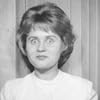Lorraine Petkus
asked:
What are your conclusions on the ending? Don't want to add spoilers yet.
To answer questions about
Transcription,
please sign up.
Anne
This answer contains spoilers…
(view spoiler)
Chloe
This answer contains spoilers…
(view spoiler)
Robert Gluck
This answer contains spoilers…
(view spoiler)
Barry Davidoff
This answer contains spoilers…
(view spoiler)
Jocelyn Mel
Much of the story came from the true stories from War memoirs and BBC history. Atkinson conflated the character of Julia with Joan Miller nd another spy who was a double agent for the Soviets. It's not unbelievable. And I loved this speech about Julia: the little blind mole
you think that the Soviets should be our friends, that we would not have won the war without them and why should they now be denied the same scientific know-how as us? Fuchs’s argument, is it not? Is that why you retrieved the documents for the Soviets? Tell me, Miss Armstrong—the purges, the show trials, the forced-labor camps—they don’t worry you? Somehow I can’t see you working in a rural cooperative or a factory.” “I don’t want to live in Russia.” “That’s your problem, you see, you and Merton and his ilk. You’re intellectual Communists, but you don’t actually want to live beneath its iron thumb.” “It’s called idealism, I suppose.” “No, it’s called betrayal, Miss Armstrong, and I expect it’s exactly the same argument that Godfrey’s informants used. How tediously naïve you are.”
you think that the Soviets should be our friends, that we would not have won the war without them and why should they now be denied the same scientific know-how as us? Fuchs’s argument, is it not? Is that why you retrieved the documents for the Soviets? Tell me, Miss Armstrong—the purges, the show trials, the forced-labor camps—they don’t worry you? Somehow I can’t see you working in a rural cooperative or a factory.” “I don’t want to live in Russia.” “That’s your problem, you see, you and Merton and his ilk. You’re intellectual Communists, but you don’t actually want to live beneath its iron thumb.” “It’s called idealism, I suppose.” “No, it’s called betrayal, Miss Armstrong, and I expect it’s exactly the same argument that Godfrey’s informants used. How tediously naïve you are.”
Regan
This answer contains spoilers…
(view spoiler)
Tina Gordon
I feel as though I need to read it a second time. The end confused me and left me wondering what I missed. I think what doesn't work is that the narrative is tightly written with so many minute details that the huge, unexplained gaps don't fit or work. That said, I still enjoyed the book and may ultimately read it again.
Nancyann
A not-so-surprise lead up to a terrific ending.
lauren lese
**SPOILER ALERT**
This is my interpretation but I am not certain about any of it. Juliet was recruited by Merton in 1940 who was actually a British traitor spy; doing work for the Russians in Britain, with the help of Alleyne. She did not know this originally and I don't think she was given any work to do by Merton during the war. The others (Toby, Ashrakan collar man, Mrs Ambrose) did know and that was why they wanted to keep a close eye on her and placed her in that apartment and gave her other operations. They wanted to "neutralize her". I think giving her the dog was part of it too, it made her stand out and kept her busy. The idea was to prevent Merton and Alleyne from using her for their purposes and it succeeded, at least in 1940. That is why we had no inkling of it.
Later, at some point, she began doing much more work for Merton, assisting the Russians. So an "operation" was created to stop them which involved bringing Toby and Ambrose back. All the stuff with the young mother living at Toby's old house and the yarn store was part of that operation. Anyway, she is caught, but she ends up escaping. I have no doubt the "accident" at the end was not an accident.
This is my interpretation but I am not certain about any of it. Juliet was recruited by Merton in 1940 who was actually a British traitor spy; doing work for the Russians in Britain, with the help of Alleyne. She did not know this originally and I don't think she was given any work to do by Merton during the war. The others (Toby, Ashrakan collar man, Mrs Ambrose) did know and that was why they wanted to keep a close eye on her and placed her in that apartment and gave her other operations. They wanted to "neutralize her". I think giving her the dog was part of it too, it made her stand out and kept her busy. The idea was to prevent Merton and Alleyne from using her for their purposes and it succeeded, at least in 1940. That is why we had no inkling of it.
Later, at some point, she began doing much more work for Merton, assisting the Russians. So an "operation" was created to stop them which involved bringing Toby and Ambrose back. All the stuff with the young mother living at Toby's old house and the yarn store was part of that operation. Anyway, she is caught, but she ends up escaping. I have no doubt the "accident" at the end was not an accident.
Pep
This answer contains spoilers…
(view spoiler)
John
This answer contains spoilers…
(view spoiler)
Serge
With the Toby/Hazeldine character so obviously modelled after George Smiley, my theory during the wartime chapters was that Perry was a German spy giving worthless information to the British through the transcriptions, and that the real information was obtained secretly by Toby and handed over to "Mr. Fisher" through dead letters. Then the twist ending is pulled out of the hat! If so many intelligent readers cannot figure it out, than we have all been cheated - it is neither possible nor worth figuring out. John LeCarré (the names of whose characters are used throughout the novel) does not write the whole book from a single character's point of view, therefore his plot twists are legitimate. But in the novel at hand there are no clues, no matter how many times we reread. The author should have stuck to the well-researched wartime story.
Karen Sylvan
This answer contains spoilers…
(view spoiler)
Lissa Shuba
I'm still wondering how she got to the ending.
Ellen Jenner
I did not understand it. I still don't. It caught me off guard, and that almost never happens when I read, unless it's a novel by Ian McKellen!
Jennifer
This answer contains spoilers…
(view spoiler)
Seath Tankard-Crook
There are plenty of clues - her love for Shostakovich, for example, and her visceral dislike of the Nazi sympathisers. You have to remember that the USSR was our ally at the time; it was highly likely that the Germans would successfully invade the UK in 1940 and the USA were non committal about supporting us. In that context, many people would have had sympathy with the USSR. Once sucked in, she wouldn't have been given an option to desist and Atkinson makes it clear that she only continues reluctantly.
Julie
I love the ending! The author's note explained so much.
Anna
Read the author's afterward.
About Goodreads Q&A
Ask and answer questions about books!
You can pose questions to the Goodreads community with Reader Q&A, or ask your favorite author a question with Ask the Author.
See Featured Authors Answering Questions
Learn more
















